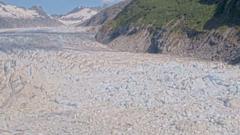As Donald Trump welcomed Vladimir Putin during a summit in Alaska, Ukrainians reacted negatively, perceiving the warm reception for the Russian leader—linked to the ongoing war in Ukraine—as a troubling legitimization of aggression. Opinions among Ukrainian citizens and analysts vary, denouncing the ceremony as an affront to those affected by the conflict while observing Trump's lack of tangible outcomes from the meeting.
Divergent Perceptions: Trump-Putin Summit in Alaska Viewed Differently in Ukraine

Divergent Perceptions: Trump-Putin Summit in Alaska Viewed Differently in Ukraine
The recent summit between Donald Trump and Vladimir Putin in Alaska sparked contrasting reactions from the international community and Ukraine, highlighting deep concerns over perceived diplomatic legitimacy.
The world watched as Donald Trump extended a polite invitation to Vladimir Putin for a summit in Alaska. The occasion, however, produced mixed feelings, particularly in Ukraine, where citizens woke up to the worry that Trump might yield significant concessions to the Russian leader amid ongoing turmoil from the war.
Instead of robust agreements, the summit ultimately became a spectacle with little political aftermath. The lack of tangible outcomes was, paradoxically, a source of relief for many in Ukraine, who feared the consequences of any potential deals. The focus of the day shifted to the optics of the summit, which, for many Ukrainians, was difficult to stomach.
Putin's arrival was marked by a ceremonial reception unusual for a leader facing international isolation due to his aggressive actions in Ukraine. American soldiers rolled out the red carpet, and Trump warmly greeted the Russian president—a display described as appallingly inappropriate by some Ukrainians. Ukrainian lawyer Maria Drachova likened the event to a carefully crafted performance, suggesting it was meant to flatter Putin at the expense of acknowledging the gravity of his actions.
Reports have suggested that public sentiment in Ukraine viewed the summit as a platform for legitimizing a man deemed a war criminal, evidenced by comments from Oleksandr Kovalenko, a political analyst who expressed dismay at the lack of restraint afforded to Putin during the exchange. The theatrics were perceived as normal diplomatic behavior but grossly inappropriate under current circumstances.
During the press conference after their discussions, a pointed question was directed at Putin regarding civilian casualties from the ongoing conflict in Ukraine, to which the Russian leader merely smirked. The interactions prompted outrage among Ukrainians, as expressed by Serhii Orlyk, a resident from Donetsk, who articulated feeling "crushed" by the proceedings. The gleeful atmosphere observed between the two leaders did little to reassure those suffering from the war's consequences, which have claimed countless lives.
Kier Giles, a senior fellow at Chatham House, underscored that Trump's deference to Putin at the meeting was detrimental, as it appeared to prioritize the Russian leader's image over the reality of his actions. The summit's fanfare may not sway European counterparts to adopt a similar approach, as concerns about endorsing Putin's narrative continue to linger in diplomatic discussions regarding Ukraine.
In light of this diplomatic display, Ukrainian President Volodymyr Zelensky is preparing for a return to Washington, hoping this time to bypass undesirable concessions while maintaining the integrity of Ukraine’s position. As many reflect on the Alaska meeting, the consensus is clear: lavish receptions for leaders implicated in war crimes are unfitting and potentially hazardous, undermining the very principles of international law and accountability.






















